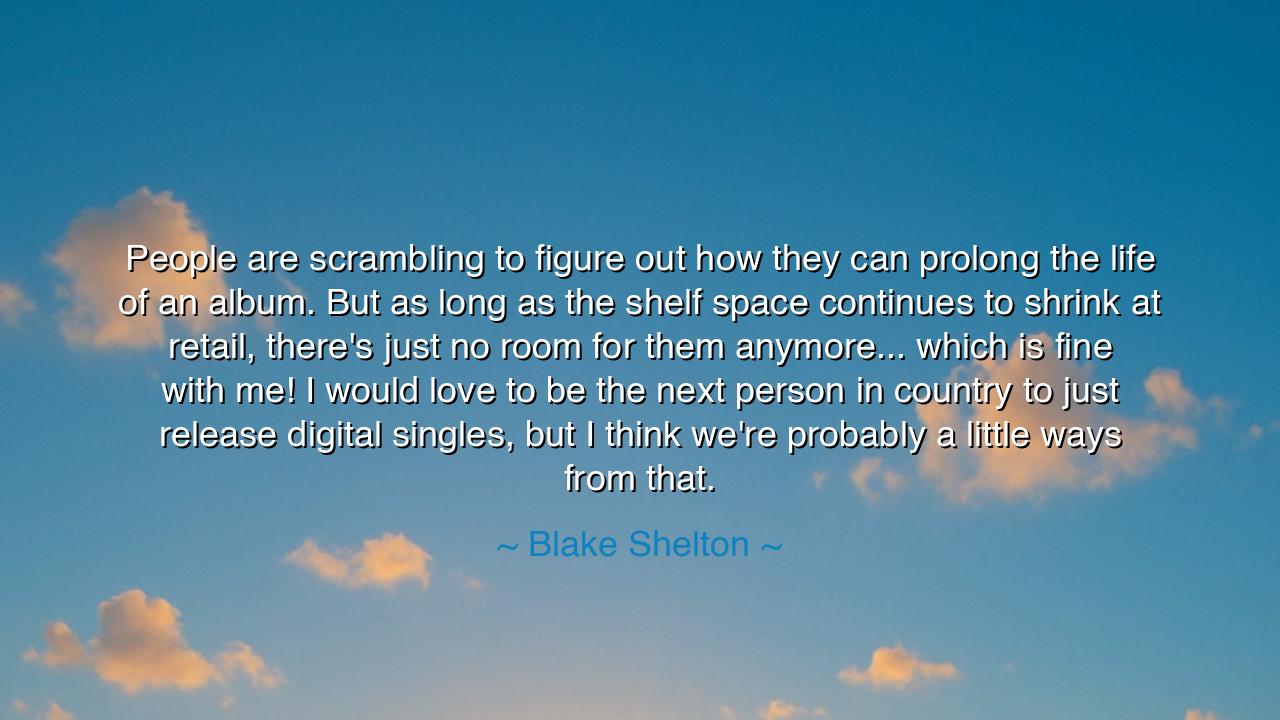
People are scrambling to figure out how they can prolong the life
People are scrambling to figure out how they can prolong the life of an album. But as long as the shelf space continues to shrink at retail, there's just no room for them anymore... which is fine with me! I would love to be the next person in country to just release digital singles, but I think we're probably a little ways from that.






Hear the words of Blake Shelton, singer of songs and voice of his generation, who declared: “People are scrambling to figure out how they can prolong the life of an album. But as long as the shelf space continues to shrink at retail, there’s just no room for them anymore... which is fine with me! I would love to be the next person in country to just release digital singles, but I think we’re probably a little ways from that.” Within these words lies not only the story of music, but the eternal story of change, of tradition meeting innovation, of the old vessel giving way to the new.
For what is the album, if not the vessel of an age? Once, it was the crown of the artist’s labor: a collection of songs bound together, placed upon shelves, purchased and cherished by listeners who held the record, the tape, the disc in their hands. To prolong the life of the album was to preserve a tradition, to cling to the familiar shape of music’s journey. Yet Shelton, with eyes clear to the horizon, acknowledges that the shelf space shrinks—the world no longer treasures the physical as it once did. Retail shrinks, and with it, the altar where albums once sat in glory.
In its place rises the digital single, a new form, carried not by shelves of wood and steel, but by the invisible channels of the internet. Songs no longer wait for twelve companions to be released—they stand alone, ready to fly across the world in an instant. Shelton does not fear this change; he welcomes it, declaring it “fine with me,” for he understands what many resist: that art is not bound by format, but by spirit. The song will endure, whether pressed into vinyl or streamed through the air. The vessel changes, but the fire remains.
History has shown this pattern before. When the printing press was invented, scribes mourned the fading of handwritten manuscripts. When cinema rose, many declared the death of the theater. When television spread, some feared the end of radio. Yet in each case, though the vessel changed, the spirit of storytelling endured. So too with music: though the album may decline, the song—the ancient cry of the human soul—remains immortal. Shelton’s words are a reminder that clinging too tightly to the past blinds us to the opportunities of the future.
And yet, his words are not without patience. He says, “we’re probably a little ways from that.” Change, though inevitable, does not come in a single day. The album will linger, the shelves will not vanish overnight, and tradition will still hold power for a time. But the wise see beyond the present, and Shelton shows himself among them: ready to embrace the new world even as he honors the old.
The lesson, O seeker, is this: do not resist change, but neither rush blindly into it. Stand with one foot in tradition, to honor what has brought you here, and one foot in the future, to step boldly into what is coming. Do not mourn the shrinking shelves, for they are only wood and steel. Rejoice instead in the unbound freedom of a song that can reach any ear, in any place, at any time.
So let Shelton’s words echo as a call to courage: when the vessel fades, hold fast to the spirit. The forms of art, of work, of life itself will shift with every generation. Do not scramble to prolong what is dying; instead, prepare yourself to thrive in what is being born. For the world will always change, but those who sing with honesty, who create with truth, who dare to adapt—these will endure, as music itself endures, eternal as the human soul.






AAdministratorAdministrator
Welcome, honored guests. Please leave a comment, we will respond soon